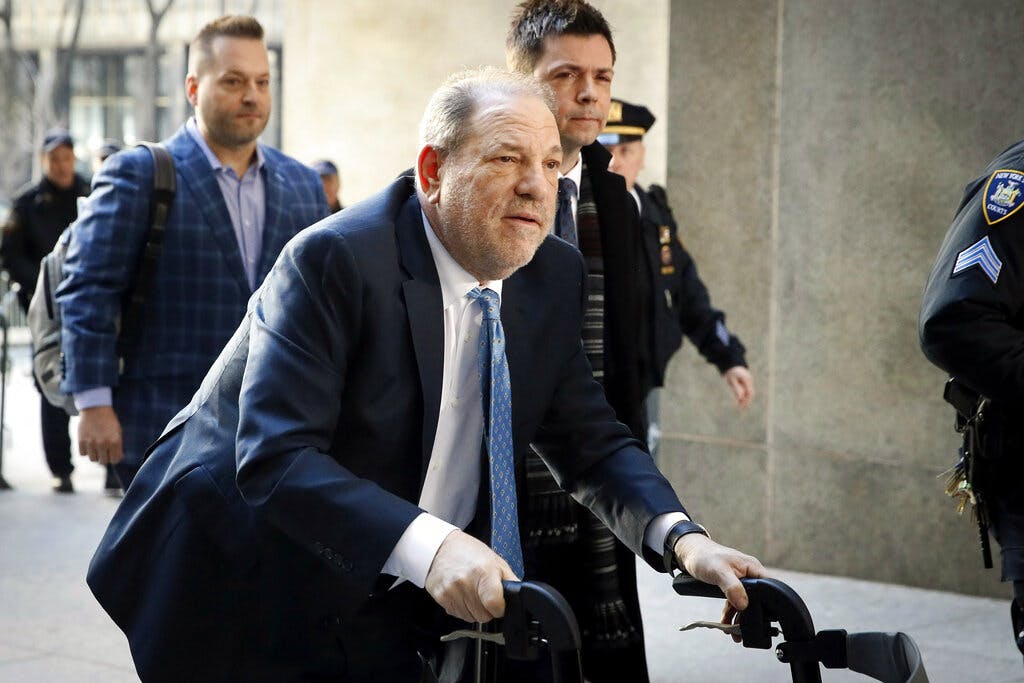‘1-800-THE-DONALD’?
As President Trump’s trial gets under way, New York’s high court comes in with a ringing defense of due process for criminal defendants — even those with dubious reputations.

The reversal by New York’s top court of Harvey Weinstein’s rape conviction comes at a dramatic moment, as the district attorney of New York County commences its trial of President Trump. New York’s top court found Weinstein’s due process rights were violated by a judge whose rulings, the defense said, created a spirit of “1-800-GET-HARVEY.” Now an even more famous defendant, Donald Trump, is in the dock and a similar spirit prevails.
Let us mark that we carry no brief for either Weinstein or Mr. Trump. We do, however, carry a brief for their rights to constitutional due process — “equal justice under law,” as it says on the pediment of the Supreme Court. That is the issue in both cases. The Court of Appeals is right as rain to be particular on this head. The news this morning can be taken as a flashing yellow light to Justice Juan Merchan and District Attorney Alvin Bragg.
That’s because, as these columns have noted, the theme of Mr. Bragg’s pursuit of the GOP front-runner — even before the DA took office, when he was merely a candidate for office — can be summed up as “Get Trump.” Mr. Bragg, after all, won the Democratic primary in part by crowing to voters about how he had “investigated Trump and his children” and boasting that he knew “how to follow the facts and hold people in power accountable.”
Mr. Bragg plowed ahead with the prosecution despite a cautionary flag thrown down by his predecessor, Cyrus Vance, Jr. The gist was that the case against Mr. Trump involved “novel issues,” like the attempt to use a “false statements statute in connection with committing a crime that violates federal election laws.” Did the goal of nailing Mr. Trump — to fulfill Mr. Bragg’s apparent campaign vow — transcend any concerns over the niceties of the law?
That concern has been vindicated by this week’s disclosure of the second charge Mr. Bragg is deploying in order to elevate a misdemeanor — falsifying business records — into a felony. Mr. Trump’s alleged second crime, legal sage Jonathan Turley explains, is “conspiring to unlawfully promote his own candidacy,” in part by paying “hush money” to “quash a potentially embarrassing story” — his alleged affair with adult actress Stormy Daniels.
“We’ve never seen a case like this one,” Mr. Turley writes, “where a dead misdemeanor from 2016 could be revived as a felony just before the 2024 election.” Better yet for Mr. Bragg, our A.R. Hoffman writes, this “second crime needs only to be alleged, not proven beyond a reasonable doubt.” By allowing a “Get Trump” case like this to go forward, Judge Merchan risks a similar rebuke to that the state high court handed down in Weinstein’s case.
Today’s opinion also raises questions including over the Ghislaine Maxwell case. A federal court nixed her claim of immunity, based on a non-prosecution deal between Jeffrey Epstein and federal prosecutors. Riders of the Second Circuit were skeptical of Maxwell’s argument, but a prosecutor’s immunity pledge is what sprang Bill Cosby. In Mr. Cosby’s case, there wasn’t even a written agreement, just a press release from a local district attorney.
Weinstein’s trial judge, the high court ruled, erred by letting women with no ties to the case testify. He gets a new trial, even as a separate rape conviction, in a Califloria court, stands. The Times now paints Weinstein’s New York case as “fragile since the day it was filed” due to prosecutors’ “risky, boundary-pushing bets.” An ex-prosecutor, Deborah Tuerkheimer, avers “I’m not shocked.” The trial’s fairness, she adds, “is a really close question that could have gone either way.”
Kudos to New York’s high court for clarifying that fairness shouldn’t be a close call. “Every person accused of a crime is constitutionally presumed innocent and entitled to a fair trial,” the judges rumbled. In words that could be pointed to Mr. Bragg and Judge Merchan, among others, the judges stressed their “solemn duty to diligently guard these rights regardless of the crime charged, the reputation of the accused, or the pressure to convict.”

